This originally appeared in the June 24, 1994 issue of the Chicago Reader, with a slightly different title (“Can Film Be Fascist?”) —J.R.

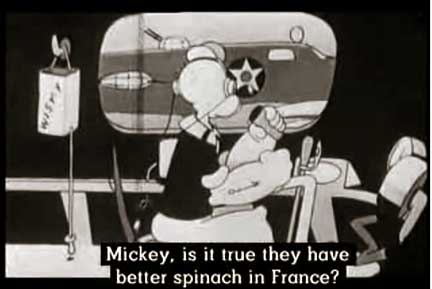
** THE WONDERFUL HORRIBLE LIFE OF LENI RIEFENSTAHL
(Worth seeing)
Directed and written by Ray Muller.
*** THE EYE OF VICHY
(A must-see)
Directed by Claude Chabrol
Written by Jean-Pierre Azema and Robert O. Paxton.
Last year, about the time that Ray Muller’s mediocre if watchable three-hour documentary about Leni Riefenstahl was getting widespread coverage in New York, a European friend thoughtfully sent me a tape of Looking at “Triumph of the Will”, an excellent 45-minute BBC program designed to introduce Riefenstahl’s famous Nazi propaganda film to a contemporary audience. Interviewing such commentators as Hugh Hudson, Annette Insdorf, Claude Lanzmann, George Steiner, Hans-Jurgen Syberberg, Budd Schulberg, and Brian Winston, the program offered diverse historical, ideological, and aesthetic perspectives without privileging any single point of view. Riefenstahl herself refused to be interviewed, yet her own self-serving interpretation of her career was included, as well as that of one of her American apologists — David Hinton, the author of a book about her, who argues, as Riefenstahl does, that Triumph of the Will should not be regarded as propaganda. Read more
From the June 1, 1994 Chicago Reader. — J.R.
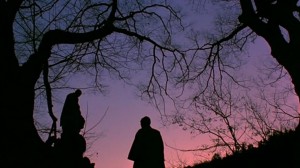
A much more serious treatment of Buddhism than Bernardo Bertolucci’s Little Buddha, this 1989 Korean feature by Bae Yong-kyun (who produced, directed, shot, and edited) has become something of a cult film, and it’s easy to understand why. The title is an unanswerable Zen koan, at one point echoing the narrator’s queries: Who is Buddha? Who isn’t he? The skeletal plot concerns an old master, a young disciple, and an orphaned boy in a remote Korean monastery in the mountains, but the film’s main offering is its contemplation of and inexhaustible fascination with the natural world; indeed, we periodically have the sensation that the narrative has been suspended almost entirely for the sake of this meditation. Full of ravishingly beautiful images rather than ravishingly beautiful shots, the film conveys not so much a filmic intelligence as a Buddhist intelligence that’s being translated, step-by-step, into movie terms; the film seems to reach us from a certain remove, with positive as well as negative consequences. Count on something slow, arresting, and lovely, and if you’re looking for drama, expect to find it internally. 135 min. (JR)
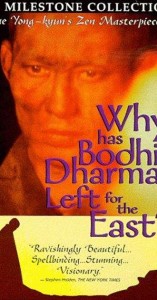 Read more
Read more
The following was written for the May 1976 issue of Monthly Film Bulletin. —J.R.
Screwball Squirrel
U.S.A., 1944
Director: Tex Avery
Cert—U. dist—Ron Harris. p.c—MGM. p—Fred Quimby. story—Heck Allen. col—[originally made in Technicolor]. anim—Preston Blair, Ed Love, Ray Abrams. m—Scott Bradley. 248 ft. 7 min. (16 mm.).
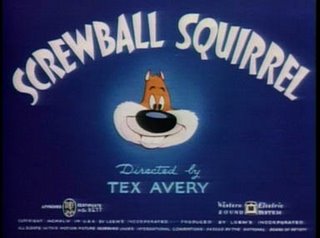
After beating up Sammy Squirrel — an effeminate Disney-like creature who purports to be the hero of the cartoon — Screwy Squirrel enters a phone booth and calls Meathead the dog to get another plot going. After an extended chase, Meathead tries to end the cartoon, but Screwy offers him one more chance to catch him. The results are immediately complicated by the fact that both confess to have been twins all along; a revived Sammy joins the group.


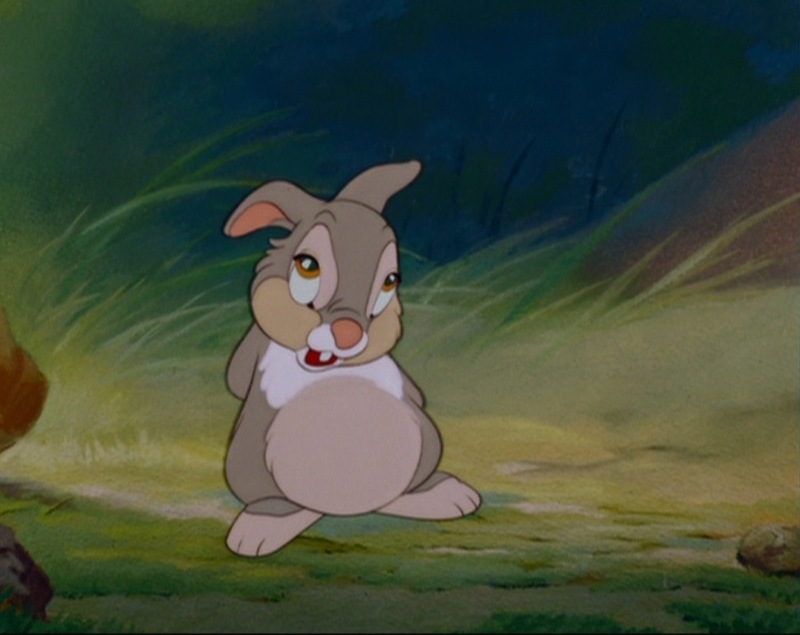
As Joe Adamson had ungrammatically but aptly noted, “Screwy Squirrel is Daffy Duck taken one step further that he absolutely has to.” A thoroughly demented character who lasted through five cartoons in the mid-Forties (Screwball Squirrel, Happy-Go-Nutty, Big Heel-Watha, The Screwy Truant, and Lonesome Lenny), he seems important in Avery’s career not so much for his own intrinsic qualities — monotonously aggressive mania and not much else — as for the wild bouts of anti-illusionist high jinks and comparable assaults on the audience that he provoked in his creators. Read more
From the Chicago Reader (January 1, 1989). — J.R.
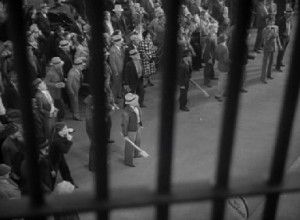
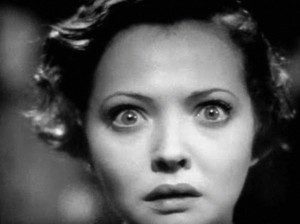
Unjustly accused of a crime, a man (Spencer Tracy) barely escapes a lynching and returns to wreak vengeance on the mob that nearly killed him. Fritz Lang’s first American film, made in 1936, remains one of his most powerful and fully achieved; the pitiless overhead camera angle, which carries such force in many of his other films, has a particular impact here when it appears in an impromptu documentary, a film within the film, of a near lynching that is used as courtroom evidence. Sylvia Sidney plays the hero’s fiancee, and the strong secondary cast is headed up by Walter Abel, Bruce Cabot, Edward Ellis, Walter Brennan, and Frank Albertson. Essential viewing, however bitter the aftertaste. 90 min. (JR)
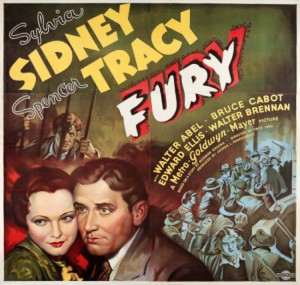 Read more
Read more
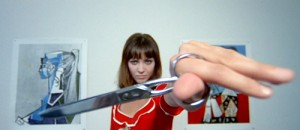
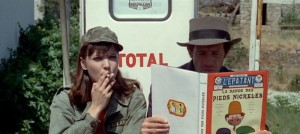
“I wanted to tell the story of the last romantic couple,” Jean-Luc Godard said of this brilliant, all-over-the-place adventure and meditation about two lovers on the run (Jean-Paul Belmondo and Anna Karina). Made in 1965, this film, with its ravishing colors and beautiful ‘Scope camerawork by Raoul Coutard, still looks as iconoclastic and fresh as it did when it belatedly opened in the U.S. Godard’s misogynistic view of women as the ultimate betrayers is integral to the romanticism in much of his 60s work — and perhaps never more so than here — but Karina’s charisma makes this pretty easy to ignore most of the time. The movie’s frequent shifts in style, emotion, and narrative are both challenging and intoxicating: American director Samuel Fuller turns up at a party scene to offer his definition of cinema, Karina performs two memorable songs in musical-comedy fashion, Belmondo’s character quotes copiously from his reading, and a fair number of red and blue cars are stolen and destroyed. In French with subtitles. 110 min. (JR)
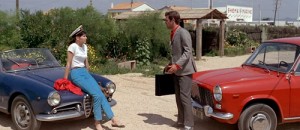
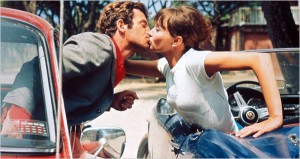 Read more
Read more
It’s really sad: Wikipedia had listings for no less than eight different men named John Berry when I originally posted this article, but the film director (1917-1999) wasn’t one of them (fortunately, this is no longer the case); and you won’t find an article about him in Senses of Cinema’s Great Directors, either. I can’t say I knew the man well. but I consider myself fortunate to have spent some time with him in a variety of places — including film festivals in Rotterdam and Vienna, in Paris, and even one enjoyable evening at a jazz disco in Taipei. His accounts of his experiences with Orson Welles in the Mercury Theater -– which included several hours of holding up scenery during the shooting of Too Much Johnson — were priceless.
The following comes from the February 2, 2001 issue of the Chicago Reader. — J.R.
 Boesman & Lena ***
Boesman & Lena ***
Directed by John Berry.
Written by Athol Fugard and Berry.
With Danny Glover, Angela Bassett, and Willie Jonah.

Director John Berry got his big start as an actor in Orson Welles’s Mercury Theatre in 1937. Welles then introduced him to film in 1938 when he hired him as assistant director on a silent slapstick film made to accompany and introduce portions of the stage farce Too Much Johnson. Read more

















